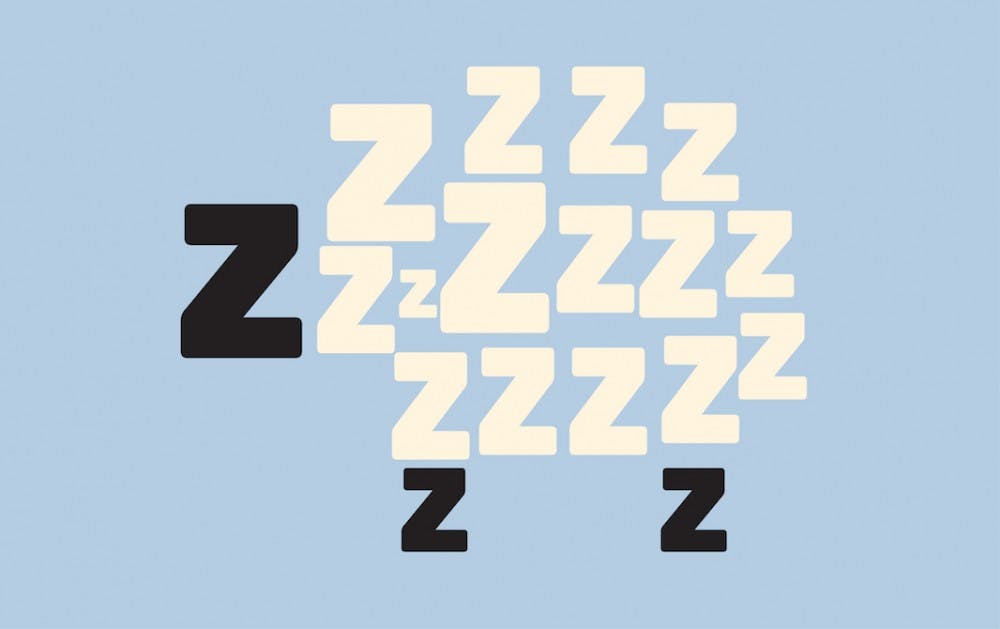Many college students do not prioritize their sleep – work, school and social activities often take precedence to a good night’s rest – but professors at universities across the country are teaching students how to improve the amount and quality of their sleep. One of the latest schools to add such a class is Arizona State University.
Only 6.5 percent of students say they get enough sleep throughout the week, and about 73 percent say that at least once a week they stay up late to study instead of sleeping, according to a 2015 survey of ASU students conducted by the American College Health Association.
Brown University, University of Missouri, Stanford and New York University are just a handful of the colleges currently offering students classes on sleep. These classes cover everything from the science behind sleep to dream analysis and are meant to help students improve their overall health.
Shawn Youngstedt, an ASU professor in the colleges of Nursing and Health Innovation and Health Solutions, says that not receiving an adequate amount of sleep can negatively impact students' classroom performance and lead to decreased mental and physical health.
Between early-morning classes and late-night social activities, students often do not prioritize sleep and find it difficult to go to bed and wake up at a consistent time.
“They have to shift back and forth between sleeping in late and going to bed late on the weekends to getting up earlier on the weekdays, and that’s hard to do,” Youngstedt says.
While You Were Sleeping – NYU
One of the most prominent sleep courses in the country is a class taught at NYU called While You Were Sleeping.
Jess P. Shatkin, one of the professors of While You Were Sleeping, says the course teaches students about the neurobiology of sleep, the history of sleep, the evolution of sleep over a student’s lifetime, sleep debt, circadian rhythm, dreams and sleep hygiene.
“We spend a quarter or a third of our lives asleep and no one talks about it,” Shatkin says. “So, it’s something the students really want to learn about.”
A large part of the course is a section titled the Sleep Improvement Program which involves students writing a sleep log detailing their experience with sleep over the semester and creating an action plan for how to improve their sleep.
The students choose methods learned in the class that are potentially helpful for improving sleep, try them out over a span of two weeks, and observe which ones work best for them.
In 2014, Shatkin and Argelinda Baroni, who also teaches the course, conducted a study to determine its effectiveness. The study compared the sleep patterns of 70 students enrolled in While You Were Sleeping to another 75 students enrolled in a different NYU psychopathology class that had no substantial sleep education component.
Shatkin and Baroni examined students’ sleep and waking times to compare the amount of sleep students received at the beginning and end of the semester. They found that, on average, students who were enrolled in the class were getting 18 additional minutes of sleep per night by the end of the semester, after having taken the course. Meanwhile, students who were not enrolled in the course received, on average, 12 fewer minutes of sleep by the end of the semester.
Shatkin says that when creating the class in 2011, they borrowed and adapted aspects from courses that schools like Stanford and Brown University were already teaching to create a class they thought effectively addressed sleep issues that college students face.
Tyler Rabinowitz, an NYU alumnus who took the While You Were Sleeping class his freshman year as a film major, works as a post-graduate teaching assistant for the class. Rabinowitz says he took the class because he expected it to be an interesting, easy course, but it ended up having a profound impact on his life and quality of sleep.
Rabinowitz says the course taught him many helpful practices to improve his sleep, like placing his phone across the room at night and not eating certain foods (namely, spicy and high-fat foods) too close to bedtime.
He says one of the best things about the class is that it offers helpful ways each student can alter their own sleep patterns to find what works best for them individually because a solution that works for one person to improve sleep may not be practical or effective for everyone.
“A lot of (sleep improvement methods) sound wonderful in theory, but when you get into habits, it can be hard to break them,” Rabinowitz cautioned.
Rabinowitz says he wishes the class was a prerequisite for all students, and he said that freshmen especially would benefit throughout their entire collegiate career if they were equipped with the tools and knowledge offered in the class early on.
“One of the greatest epiphany moments for students is finding out that cramming before a test puts them in a worse position than just getting sleep,” he says. “If you were a freshman and received that knowledge, imagine how different it’d be.”
He also says that many students’ favorite part of the course is the unit on dream analysis, which includes using dreams to understand issues and concepts students are dealing with in their life.
“There’s very little that our body does on accident. Why would we treat dreams any differently?” Rabinowitz says.
Sleep, Sleep Disorders and Behavior – ASU
ASU has offered a similar class to While You Were Sleeping during two previous semesters called HCR 245: Sleep, Sleep Disorders and Behavior. The class was previously offered as a special topics course, but as of the Fall 2018 semester, it will have a permanent course number in the course catalog.
Taught online by assistant professor Megan Petrov, the class teaches students about the functions of sleep throughout their lifetime and about sleep patterns as influenced by biological, psychological and sociological factors. Students do not need any prerequisites to be eligible to enroll in the class.
Petrov says many university sleep courses around the country, including the one at ASU, are based on the teachings of William Charles Dement, a sleep researcher who founded the Stanford University Sleep Disorders Clinic and Research Center, the first of its kind in the country.
Petrov, in crafting the class, is drawing off the half-century of sleep pedagogy laid down by Dement, along with her own experiences taking a sleep course at UA.
Petrov says that during the class, students complete sleep profiles and questionnaires throughout the semester to assess the quality of their sleep.
Students also keep a diary of their sleep habits and create a program consisting of three or four improvements they could make. The students then attempt to implement the solutions and, according to Petrov, a majority of them have reported that their sleep was improved by the program.
Lastly, students are involved in a community sleep project where they create a multimedia initiative to promote awareness to the public regarding a specific issue related to sleep deficiency and healthy sleep habits.
Why a specific class about sleep?
Students at ASU are required to take a version of the class ASU 101 as freshman. The focus of the class differs by major, but each includes a brief conversation about ways for students to improve their time management skills and sleep habits.
Petrov says that although ASU 101 offers students some information on sleep, a course like Sleep, Sleep Disorders and Behavior could be beneficial as a required class for freshman to emphasize the importance of sleep as part of a healthy lifestyle.
“People focus on diet and other things, but they always forget about sleep,” Petrov says.
David Salafsky, director of health promotion and preventive services at the University of Arizona, says that often students underestimate the impact sleep has on other aspects of their lives.
“You look at the data nationally, and sleep is always in the top three health issues that affect academic performance among college students," Salafsky says.
Salafsky also says he thinks it would be beneficial to have a class that focuses only on sleep that is required for all freshman.
Salafsky says the most important questions in the conversation about sleep courses is, “How can we build in more (sleep related) education where students … can actually develop the sleep skills that will carry with them throughout their adult life?”
Sleep, Sleep Disorders and Behavior might be the answer to that question for students at ASU.
Reach the reporter at abpotter@asu.edu and follow @lexipotter04 on Twitter.
Like The State Press on Facebook and follow @statepress on Twitter.




